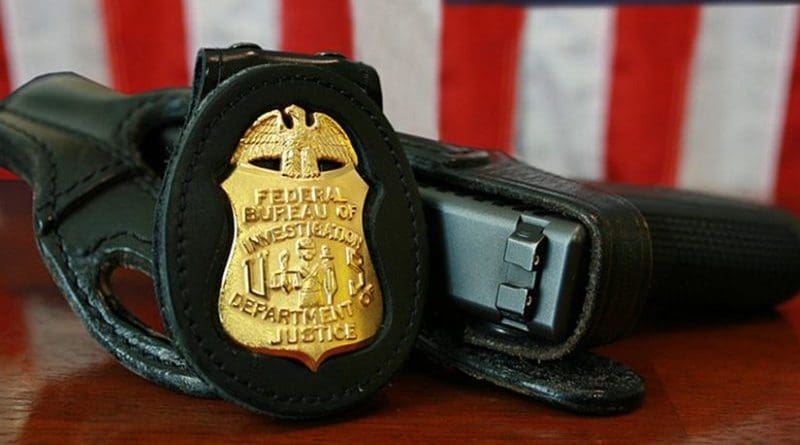The FBI’s Lawless Raid On US Private Vaults Shows Why The Founders Created The Fourth Amendment – OpEd
By FEE
By Jon Miltimore
A squad of FBI and Drug Enforcement Administration agents in March 2021 raided the Beverly Hills location of a company, U.S. Private Vaults, suspected of criminal activity.
Over several days, agents wearing masks photographed evidence, seized jewels, gold bullion, and coins, and confiscated some contraband (mostly drugs) from 1,400 safe-deposit boxes rented by an array of people, including a retired doctor, a saxophone player, a retired floor contractor, and at least two attorneys.
The grand total seized by the FBI was $86 million in cold cash, as well as Rolex and Cartier watches, rare coins, and more silver and gold than even Yukon Cornelius could imagine.
U.S. Private Vaults, which was headquartered in Nevada, pleaded guilty to charges of money laundering and conspiracy the following year. (No one went to prison, and the company is no longer in business.) But it turns out U.S. Private Vaults wasn’t the only party that broke the law.
Last month, the U.S. 9th Circuit Court of Appeals ruled that the bureau violated the constitutional rights of safe-deposit box holders whose property was seized without probable cause, something the warrant explicitly prohibited.
To understand just how far the FBI overstepped its authority, it’s worth examining the case of Don Mellein, a retired civil servant from California.
Mellein was one of hundreds of people who had a safe-deposit box at U.S. Private Vaults, where he kept hundreds of thousands of dollars of coins for safekeeping.
When the FBI raided U.S. Private Vaults, it didn’t just search Mellein’s safe-deposit box. It seized his coins, something the FBI had explicitly said it wouldn’t do when it requested a warrant to raid U.S. Private Vaults (more on that in a minute).
Numerous other plaintiffs such as Mellein had their property taken simply because they were unlucky enough to have entrusted it to a company that was involved in some degree of criminal activity.
That the FBI had the chutzpah to ignore the judge’s warrant, which explicitly “d[id] not authorize a criminal search or seizure of box contents,” did not sit well with the court.
Judges called the seizures “egregious” and “outrageous” during oral arguments, comparing them to the Revolutionary War practices of the British, who would search and seize the property of colonials without probable cause.
“It was those very abuses of power,” the 9th Circuit Court noted, “that led to adoption of the Fourth Amendment in the first place.”
The Fourth Amendment protects the “right of the people to be secure in their persons, houses, papers, and effects, against unreasonable searches and seizures,” but it’s something for which the FBI agents had little regard.
Indeed, depositions from FBI agents suggest that “forfeiting” the property of safe-deposit box holders — some would call it “stealing” — was the FBI’s plan from the very beginning.
Excerpts of those depositions, which can be read at the Los Angeles Times and Reason, make it clear that the FBI had been planning a massive asset forfeiture operation months prior to filing its affidavit with U.S. Magistrate Judge Steve Kim.
They also reveal that the FBI had been planning all along to seize the contents of all safe-deposit boxes, so long as they contained at least $5,000 (the minimum established by the Justice Department’s Asset Forfeiture Policy Manual). Testimony makes it clear the FBI was not particularly concerned whether these people were actually criminals, or that the agent who submitted the affidavit had assured Kim that the property rights of customers would be respected.
We only know all of this because a judge denied a request from the U.S. attorney’s office — surprise, surprise — to block disclosure of those depositions, laying “bare the government’s deception,” in the words of the Los Angeles Times reporter Michael Finnegan.
To call the FBI’s actions deceptive is an understatement.
Finnegan’s reporting shows FBI agents and U.S. attorneys behaving in almost mafialike fashion, demanding bank records, tax returns, and sworn statements from safe-deposit box holders and their family members — just to get their own money back!
When you read how a U.S. attorney asked a glassmaker’s lawyer how much his client was willing to pay the feds to give him his money back, you realize the 9th Circuit was not engaging in hyperbole. The FBI’s raid is not dissimilar to the “writs of assistance” that permitted Red Coats “to break open doors, Chests, Trunks, and other Packages” to find contraband or “stolen” items, a practice despised by the Colonials.
“It is a power that places the liberty of every man in the hands of every petty officer,” the 18th century statesman James Otis said in a famous speech against the writs, which led to the eventual adoption of the Fourth Amendment.
The question now is: Who will be held accountable for the FBI’s lawless, shameless raid?
- About the author: Jonathan Miltimore is the Editor at Large of FEE.org at FEE.
- Source: This article was published by FEE. This article first appeared in The Washington Examiner.

